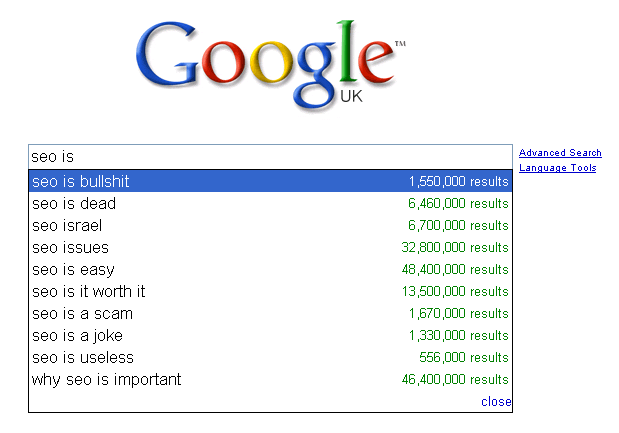A recent report by Nielson states that people are spending up to 82% more time on social networking sites like Facebook and Twitter compared to last year. So to tip the balance further in the “Is Twitter a big waste of time” debate, for a bit of Friday Fun, here are some sites to help you waste more time enjoy Twitter further.
Fun
Google Illustrates SEO’s Image Problem

Google's automatic suggestion tool shows the extent of the problem
James, Blueclaw’s Director of Paid Search, stumbled across this yesterday and took a screenshot. It shows that SEO still has a real image problem - though at least we’re saved at the end!
Where will SEO be in 10 years?
This is a question I often ask myself. As far as I can see, the answer seems to depend upon two factors – the emergence of real time search and how SEO progresses within the marketing mix.
At present it is impossible to see beyond Google when looking into the future. However, the emergence of a viable competitor does not seem as far off as it did a year ago. The merger of the Bing and Yahoo could make an impact – as long as they stop trying to play catch-up and start looking beyond existing search conventions.
One avenue that looks like it could impact upon Google’s quality-weighted algorithm is real-time search. At the moment, real-time search doesn’t offer much in terms of value for businesses. This is because of its current prominence in the social media sector. The failure of businesses to convert social media into revenue means that the connection between real-time search and revenue has not really been made.
Sheffield Floods and SEO: a strange combination
Yesterday was a strange day. It all started when I received a text with a simple statement: ‘Sheffield’s flooded’. Not something you want to hear when you’re heading home there in an hour. However, I dismissed it. Surely the ramblings of an over-dramatic girlfriend?
It wasn’t – you may have seen it on the news. Well, I got on my train, sat and waited to be taken under water to the place I call home. Except it didn’t happen, as everyone suddenly remembered trains aren’t supposed to go under water and hence it was cancelled. We were then told that local trains were still running. Marvelling at the sudden transformer-like ability of local trains to turn into boats, I headed over to the platform, where I met an American who was trying to get to Sheffield for some university-related event. We got on the train and headed towards Waterworld, talking about our jobs to pass the time.
It’s amazing what you can pick up simply by talking to someone with a different role in life. The American, a university lecturer, explained to me about some issues they were having with the University website. Apparently they had recently re-launched their business school but, they were having problems with their results in search engines for targeted search terms. The previous incarnation of the business school had closed down in 1999, but the news story reporting the closure appears top of the current search results for their targeted search terms. Therefore, people were searching for the well-publicised school, stumbling upon this news story and ringing up to ask why the school had closed already.
The moral to this story: always keep tabs on your old pages. Some SEO’s prefer to keep old content in the directory – an indexed page with old content that could still lead to a valued visitor is better than a valued visitor lost. However, as demonstrated by my American flood-victim, sometimes old content is more trouble than it’s worth.
We made it to Sheffield and lived to spread this wisdom.
